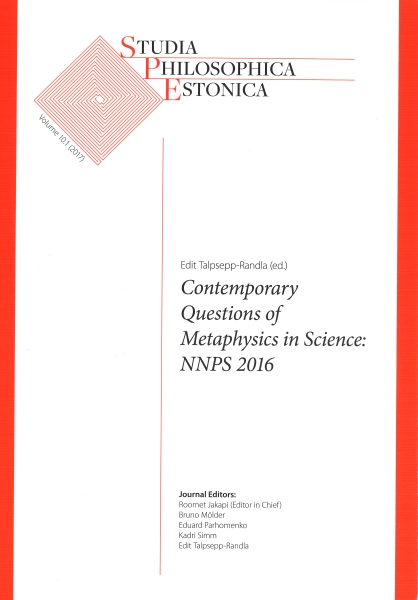The Ontology of Electromagnetism
DOI:
https://doi.org/10.12697/spe.2017.10.1.03Keywords:
ontology, electromagnetism, particle vs fieldsAbstract
Electromagnetism is usually understood as a theory describing how charged particles and eletromagnetic fields interact. In this paper I argue that a double ontology comprising both particles and fields is problematic. Either we should think of electromagnetism as a theory about charged particles directly interacting with each other, or as theory of fields whose local interactions are manifested as field quanta, called "particles." From a purely theoretical point of view the choice between a particle and a field interpretation does not matter much when it concerns classical electromagnetism; both interpretations are possible and, as shown by Quine, there is a general method for translating a theory about one kind of objects into a theory assuming another kind of objects, provided these theories are empirically equivalent. From an empiricist point of view, however, the particle interpretation is the choice, since some particles are directly observable. Testable predictions of electromagnetism are predictions of the motion of charged bodies, in theory represented as particles, so this must be the empiricists' choice of ontology. In quantum electrodynamics one is however forced to chose a field ontology, since a particle ontology for this theory is impossible. So called "quantum particles" are field quanta, which cannot be treated as individuals making up a domain of quantification. There is thus a tension regarding ontology between classical and quantum electrodynamics. But this tension is nothing else than the much debated measurement problem of quantum mechanics.
References
Sunny Y. Auyang. How is Quantum Field Theory Possible? Oxford University Press, 1995.
Jeffrey A. Barrett. ‘On the Nature of Measurement Records in Relativistic Quantum Field Theory’. (philsci-archive.pitt.edu e-print: 0000019 2001.
G. Bauer and D. Dürr. ‘The Maxwell-Lorentz System of a Rigid Charge’. Annales Henri Poincare, (2):179-19 2001.
Gordon Belot. ‘Is Classical Electrodynamics an Inconsistent Theory?’. Canadian Journal of Philosophy, 37:263-28 2007.
R. Feynman, R. Leigthon, and M. Sands. The Feynman Lectures on Physics II. Addison-Wesley Publishing Company, Reading, Ma., 1964.
Steven French and Decio Krause. Identity in Physics. A Historical, Philosophical, and Formal Analysis. Oxford University Press, Oxford, 2006.
Max Frisch. Inconsistency, Asymmetry, and Non-Locality. A Philosophical Investigation of Classical Electrodynamics. Oxford University Press, Oxford, 2005.
Max Frisch. ‘Conceptual Problems in Classical Electrodynamics’. Philosophy of Science, 75:93-10 2008.
H. Halvorson and R. Clifton. ‘No Place for Particles in Relativistic Quantum Theories?’. Philosophy of Science, 69:1-2 2002.
Gerhard C. Hegerfeldt. ‘Instantaneous Spreading and Einstein Causality in Quantum Theory’. Annalen der Physik, 7:716-72 1998a.
Gerhard C. Hegerfeldt. ‘Causality, Particle Localization and Positivity of the Energy’. In Arnow Böhm, editor, Irreversibility and Causality: semigroups and rigged Hilbert spaces ; a selection of articles presented at the 21st International Colloquium on Group Theoretical Methods in Physics (ICGTMP) at Goslar, Germany, July 16-2 199 pages 238-245. Springer, Berlin, 1998b.
A. Komech and H. Spohn. ‘Long-Time Asymptotics for the Coupled Maxwell- Lorentz Equations’. Communications in Partial Differential Equations, 25: 559-58 2000.
Marc Lange. An Introduction to the Philosophy of Physics. Locality, Fields, Energy and Mass. Blackwell Publishing, Oxford, 2002.
D. Malament. ‘In Defense of Dogma: Why there Cannot be a Relativistic Quantum Mechanics of (Localizable) Particles’. In Rob Clifton, editor, Perspectives on Quantum Reality, pages 1-10. Kluwer Academic Publishers, Dordrecht, 1996.
F. A. Muller. ‘Inconsistency in Classical Electrodynamics?’. Philosophy of Science, 74:254-27 2007.
Wolfgang Pietsch. ‘On Conceptual Issues in Classical Electrodynamics: Prospects and Problems of an Action-At-A-Distance Interpretation’. Studies In History and Philosophy of Modern Physics, 41(1):67-7 2010.
Willard V. O. Quine. ‘A Logistical Approach to the Ontological Problem’. In The Ways of Paradox and Other Essays, chapter 1 pages 197-202. Harvard U.P., 1976.
Willard Van Orman Quine. ‘Things and Their Place in Theories’. In Theories and Things, pages 1-23. Belknap Press of Harvard University Press, Cambridge, Mass., 1981.
I.E. Segal. ‘Quantum Fields and Analysis in the Solution Manifolds of Differential Equations’. In W. Martin and I.E. Segal, editors, Proceedings of a Conference on the Theory and Applications of Analysis in Function Space, pages 129-153. MIT Press, Cambridge, Ma, 1964.
P. Vickers. ‘Frisch, Muller, and Belot on an Inconsistency in Classical Electrodynamics’. British Journal for the Philosophy of Science, 59(4):767-79 2008.
Steven Weinberg. ‘The Search for Unity: Notes for a History of Quantum Field Theory’. Daedalus, 106(4):17-3 1977.
J. A. Wheeler and R. P. Feynman. ‘Classical Electrodynamics in Terms of Direct Interparticle Action’. Reviews of Modern Physics, 21:425-43 1949.





